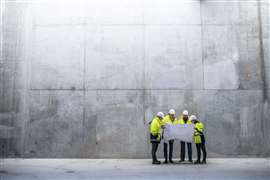Japan’s leaning tower reveals pile data scandal
17 November 2015
Last month, a residential tower block in Yokohama, Japan, was found to be tilting, due to incorrect foundation piles, which had been installed using fabricated data.
Solid ground beneath the Yokohama construction site reportedly started at a depth of about 16 m, but the contractor, Sumitomo Mitsui Construction, specified piles that were only some 14 m in length.
Following the discovery, Sumitomo Mitsui's subcontractor Asahi Kasei Construction Materials, initiated an investigation into 2,376 projects it had undertaken over ten years and found 266 instances of falsified data regarding the depth of foundation piles.
In a news conference in Tokyo last week, vice president of Sumitomo Mitsui, Yoshio Nagamoto, said, “We deeply apologise for causing troubles and worries.”
However, he insisted the construction schedule for the Yokohama building was not rushed, and refuted allegations that tight deadlines had forced the subcontractor to fabricate the piling data.
Mr Nagamoto also told the media that he felt “betrayed” by Asahi Kasei Construction Materials.
“It was very shrewd, [making it difficult for us] to detect,” he said. “There wasn’t necessarily negligence [on our side] in supervising them. We had placed too much confidence in Asahi Kasei Construction Materials.”
While admitting the company had specified piles that were not deep enough, Mr Nagamoto refused to comment on whether it had been a mistake, but instead attacked the actions of Asahi Kasei.
Referring to his own company’s calculations, he said, “They were only estimates, the solid ground started at various depths at the site. We told Asahi Kasei Construction Materials to make sure the pilings hit bedrock.”
When the revelations from Sumimoto Mitsui were first aired, there were calls for an industry-wide investigation. These resulted in an internal investigation by Japan Pile, which controls 25% of the country’s concrete pile market.
In a statement over the weekend, the company revealed it had looked into 1,000 of its own projects and discovered data manipulation in 18 of them.
STAY CONNECTED


Receive the information you need when you need it through our world-leading magazines, newsletters and daily briefings.
CONNECT WITH THE TEAM










